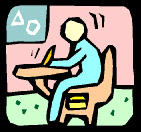

Make a point of visiting us weekly!

Return to Becoming a Learner CONTENTS PAGE
Page 13: The Learning Process - Application (Wisdom)
This page may have a slightly revolutionary feel to it because I may suggest things to you that you’ve never heard before. It is all about USING what you learn. Sadly we live in times when so often students go off to Uni and come back three years later with a degree and have no opportunity to make use of all that they have learnt.
Part 2: The Adventure of Learning
Introducing Wisdom
Wisdom isn’t something that is often spoken about in the modern world but was often referred to in the ancient world. Confucius said, “By three methods we may learn wisdom: First, by reflection, which is noblest; Second, by imitation, which is easiest; and third by experience, which is the bitterest.”
Wikipedia defines wisdom as “a deep understanding and realization of people, things, events or situations, resulting in the ability to apply perceptions, judgements and actions in keeping with this understanding. It often requires control of one's emotional reactions (the "passions") so that universal principles, reason and knowledge prevail to determine one's actions.”
Wisdom isn’t something that is often spoken about in the modern world but was often referred to in the ancient world. Confucius said, “By three methods we may learn wisdom: First, by reflection, which is noblest; Second, by imitation, which is easiest; and third by experience, which is the bitterest.”
Wikipedia defines wisdom as “a deep understanding and realization of people, things, events or situations, resulting in the ability to apply perceptions, judgements and actions in keeping with this understanding. It often requires control of one's emotional reactions (the "passions") so that universal principles, reason and knowledge prevail to determine one's actions.”

Well that’s a rather meaty, although good, definition, so let’s see if we can put it in a simple one-liner:
“Wisdom is knowing how to”
If you look at the Confucius quote above, it implies THE USE OF THE RESULTS OF reflection, imitation and experience. The Wikipedia quote speaks of “the ability to apply...” which is about doing.
Taking our short quote and merging it with the Wikipedia quote we might extend our quote to say that generally “Wisdom is knowing how to live rightly”
In this context of learning we might say that “Wisdom is knowing what to do with your learning”
Applying Wisdom in a world of possibilities
Now some things may be patently obvious. If you have just done a degree in teaching, you want to go on to be a teacher. If you have just finished an apprenticeship in plastering, you want to carry on being a Plasterer.
But suppose you have just been learning knitting. Your immediate response may be, “Well yes, so I can knit. What else is there?”
On the previous page we suggested that understanding comes through asking questions, so let’s ask a question or two: What can you knit? Why might you want to knit? What might you be able to do with your completed knitting? To whom else might you be able to teach knitting?
Now some things may be patently obvious. If you have just done a degree in teaching, you want to go on to be a teacher. If you have just finished an apprenticeship in plastering, you want to carry on being a Plasterer.
But suppose you have just been learning knitting. Your immediate response may be, “Well yes, so I can knit. What else is there?”
On the previous page we suggested that understanding comes through asking questions, so let’s ask a question or two: What can you knit? Why might you want to knit? What might you be able to do with your completed knitting? To whom else might you be able to teach knitting?

Today, although living in a time of increasing austerity because of the economic climate, we are witnessing people launching out into hitherto unknown territories. It is often said that young people today are moving away from thinking of a career, but instead thinking of a project or an enterprise that will fill their life. In other words they are starting up their own businesses.
Recap: Why learn something new?
So let’s think why you may take up a course of learning:
So let’s think why you may take up a course of learning:
- For pure enjoyment through learning a new skill or obtaining new knowledge.
- As a step to earning money either by working for someone else of starting your own business.
- As a means of learning a skill of obtaining knowledge to be used in helping others, i.e. through voluntary work.
- As one more step towards moving on to more advanced study for a qualification (which could also fit in with any of the three above.
Recap: What will you have at the end of this learning?
- New skills
- New knowledge
- A qualification

But what if...
So OK, just suppose that no job appears, no opportunity to do volunteer work appears, supposing you cannot find a niche in the market in which to introduce a new business, what then? The answer is very simple – keep learning, keep doing SOMETHING! Sitting around doing nothing is depressing and debilitating, so don’t do that.
Without giving it a great deal of thought, I would guess I have done at least ten courses in my life, and it could be double that number. We’ll consider ‘life-time learning’ in more detail on the last page of this series, but no learning will be wasted. As you learn you will increase you knowledge and increase your understanding of life and of this world and, depending what you are doing, develop new skills.
Do stuff! Unemployed? Got a digital camera and access to a computer? Get out and about and develop your skills of recording the world around you in photos and put them on Facebook which will cost you nothing but be available for others to see. Let it grow and develop. Take criticism and improve. Who knows who will spot your work?
Failed our English GCSE at school? Start a daily journal and write and write. Increase your vocabulary, work on developing your writing skills. Find a short course on writing. Talk to writers. Write your own simple children’s story. We’ve got an illustrator here on the pages of Rochford Life.
Ever been given a card-making kit for a Christmas or birthday. Take it out and give it another go. We have a card maker here on the pages of Rochford Life. Read what she says and be encouraged. See if local shops will take your cards, or sell them at Farmers Markets or at Bring and Buy sales.
DO something. Learn, develop and feel good about what you do. Enjoy it!
So OK, just suppose that no job appears, no opportunity to do volunteer work appears, supposing you cannot find a niche in the market in which to introduce a new business, what then? The answer is very simple – keep learning, keep doing SOMETHING! Sitting around doing nothing is depressing and debilitating, so don’t do that.
Without giving it a great deal of thought, I would guess I have done at least ten courses in my life, and it could be double that number. We’ll consider ‘life-
Do stuff! Unemployed? Got a digital camera and access to a computer? Get out and about and develop your skills of recording the world around you in photos and put them on Facebook which will cost you nothing but be available for others to see. Let it grow and develop. Take criticism and improve. Who knows who will spot your work?
Failed our English GCSE at school? Start a daily journal and write and write. Increase your vocabulary, work on developing your writing skills. Find a short course on writing. Talk to writers. Write your own simple children’s story. We’ve got an illustrator here on the pages of Rochford Life.
Ever been given a card-
DO something. Learn, develop and feel good about what you do. Enjoy it!

Overcoming a Difficult Market
The objective of this page is to help us think bigger and it necessitates us going round in ever increasing circles. So what can you do with you new skill, knowledge or qualification? “Not a lot,” you reply, “because there are so few jobs out there!”
So let’s ask it again, not so much why you take up new learning, but now what can you do with it once you’ve done the course?
Here are the options:
The objective of this page is to help us think bigger and it necessitates us going round in ever increasing circles. So what can you do with you new skill, knowledge or qualification? “Not a lot,” you reply, “because there are so few jobs out there!”
So let’s ask it again, not so much why you take up new learning, but now what can you do with it once you’ve done the course?
Here are the options:
- Keep developing your skill in your own little world and see what comes as you do it.
- Go hunting for a job – and keep on looking.
- Start up your own business – see if there is a market for the end product of your new skill, or a gap in the market your new knowledge could fill
- Look around to see if there are individuals, firms, businesses or organisations who you could work for, for free, so that you actually get into the market and develop your skills even more and get known and are there at the front of the queue when jobs do come up.
Each one of those things is valid and they all take you on a step from where you are – and that is the purpose of this page, to encourage you to take your learning on a further step into DOING.
